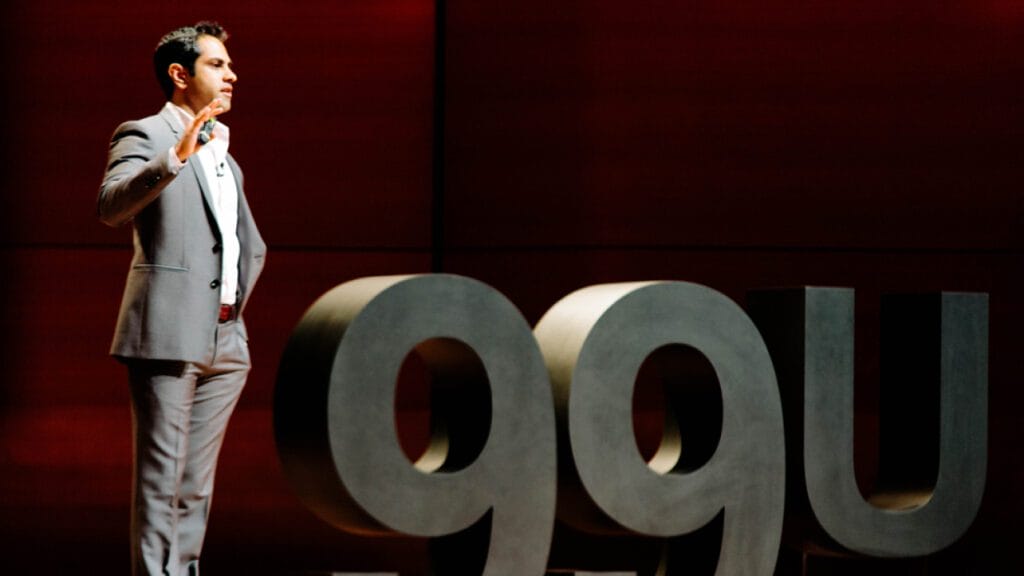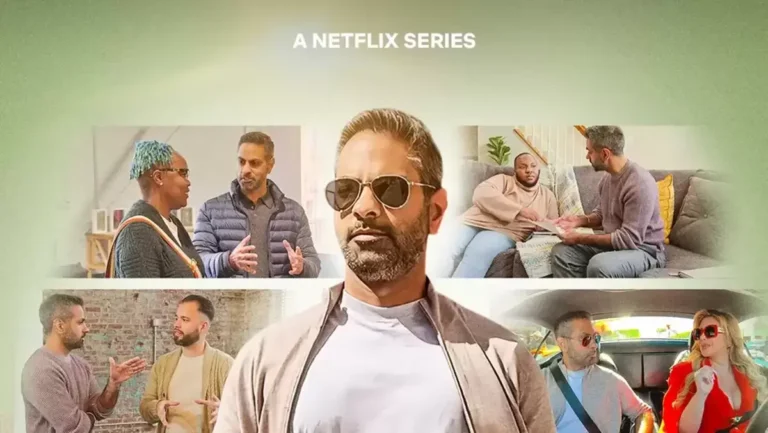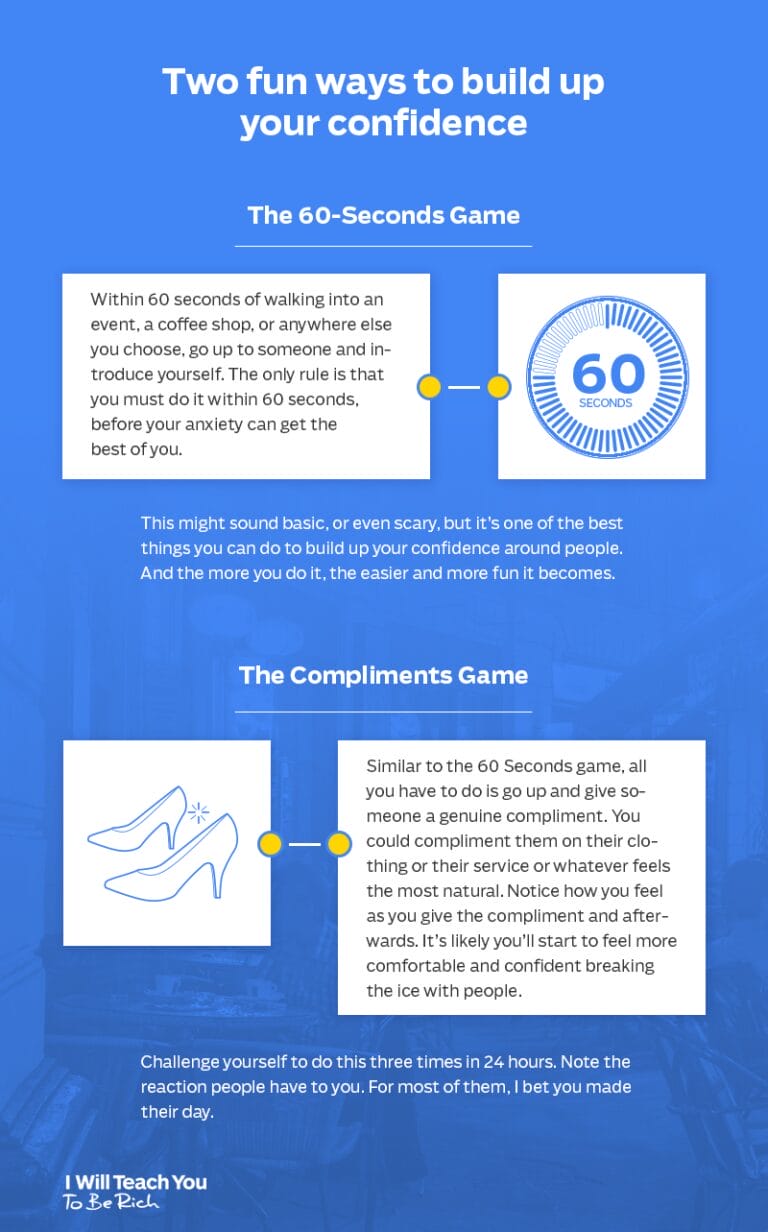How To Be Popular (my true journey from nerd to Netflix host)


Do you ever feel like you’re on the outside looking in? Like everyone has a ton of friends except you?
I totally get it. I’ve had these moments too before I learned how to become popular (Netflix popular!). I think everyone has — even Kevin Bacon, the paragon of connectedness, didn’t get recognized at the premiere of Animal House even though he was IN THE MOVIE.
When I was a teenager, I was awkward and skinny, and I talked too fast. Take a look:

This is not a picture of one of the popular kids
The good news is that it gets better. I now feel confident, not awkward. I get invited to speak at conferences….

…and I even got accused of taking steroids because of the way I look now.

One of the best moments of my life. This random Redditor accused me of using steroids (PEDs = performance-enhancing drugs) because of how I look. It hurt my feelings so much I started crying at the gym.
Did I mention that I have my own Netflix show now?

Yup, from nerd to Netflix host, yours truly.
So how did the skinny/shy dude in those photos become popular, a confident CEO, best-selling author, and a Netflix host, who got into the best shape of his life?
He applied a system of habit change to become more outgoing. He studied charisma, and learned to pay attention to the people he was talking to.
But beyond those tactics, becoming popular isn't rocket science. Let me show you how in 7 simple steps.
#1: Popular people pay attention
A little bit of empathy makes it easier to make new friends and meet people.
Often times, when we approach a social situation, we’re thinking about what WE can get out of it — instead of considering the other person.
The trick then is to go into conversations with the mindset of a curious beginner. Be inquisitive and pay attention to how they respond. Ask questions when you don’t understand something and don’t be afraid to ask follow-ups. Just don’t get too repetitive or too personal.
By doing this, you’ll actually make other people feel comfortable when you ask a question everyone else wants answered. And the person you’re asking will be thrilled to elaborate.
#2: Ask people for help with popularity
Unfortunately, no one will tell you if your social skills need work. That’s why the best way to improve your social skills is to ask for feedback. Feedback reveals hidden habits and insights you’d never notice on your own.
One of the experts on behavioral feedback is Michael Ellsberg, author of The Education of Millionaires. I want to share an excerpt of an interview I did with him where he discusses how asking for feedback transformed his life. Pay special attention to how he transforms negative feedback into life-changing improvements.
How to network and invest in youself, with Michael Ellsberg | Ramit's Brain Trust
Yes, this is hard to do! Not everyone has the courage to ask for feedback. Not everyone has the courage to try to improve themselves. But if you try, you'll find most people are eager to help and that even a few small improvements will have a major impact on your life.
#3: Learn and practice charisma
I used to believe that some people are born with charisma and some people aren’t. That some people are just natural at making new friends and public speaking — and the rest of us were stuck feeling awkward. But I was wrong.
The truth is EVERYONE can learn to be charismatic.
Charisma is a skill, and like any other it can be learned, honed, and mastered. It takes practice (like the charisma games at the bottom of this article).
Charisma is powerful and it makes the people around you feel special. Use the techniques from this article and you will see positive changes in the way people react and engage with you.
Let’s say there’s a world-class chef who’s about to cook you the best omelette you’ve ever had. It should be easy to crack a few eggs right?
Now break down every step that that chef has to go through. That chef has to:
- Choose the eggs
- Heat up the butter in the pan to the perfect temperature
- Break the eggs without any shells falling in
- Whisk them so they’re broken up — and yet not too runny
- Choose fresh vegetables
- Chop them up with expert precision
- Pour the eggs in pan while making sure that all the sides are even
You get the idea. Each of these seemingly simple elements were areas that the chef had to master — drawing upon years of experience in order to create a fantastic omelette.
Charisma is the exact same way. You can learn to be great at small talk or you can be a master of body language, but if you don’t make sure you’re training all of your individual “muscles” you won’t truly be charismatic. One of those “muscles” is small talk.
#4: Master small talk and make a good impression
“But Ramit, I HATE small talk! Why can’t I just get straight to the point?”
Small talk is a CRITICAL part of life and building relationships — it’s what helps people get to know each other, establish meaningful connections, and lay down the foundation for great long-term relationships.
The term “small talk” is actually a complete misnomer because of its HUGE impact on forming relationships and developing unshakeable confidence. As such, it takes a lot more care and nuance than just getting right down to the point.
If you walked right up to a CEO you admired at a mixer or convention and said, “I REALLY LIKE YOU. GIVE ME A JOB, PLEASE!” how do you think she’d react? She probably wouldn’t give you that job.
But if you went in with some care, and drew her into an amazing conversation and THEN asked her for a job (or better yet just advice or a coffee meeting), she’d be a hell of a lot more susceptible to it.
The trick is taking an active role in the conversation. Help it flow in the way you want it to go.
So, what do you say then? What happens when you’re at an event or party and see somebody you want to talk to…but don’t know how to get a discussion started?
There are actually 3 lines you can use to start a conversation. And no, these aren’t pick-up lines or “negging” or whatever skeezy seduction tactics other “experts” try to sell you. They’re simple, effective lines to help you jumpstart a great conversation.
Conversation starter #1: “What brought you here?”
Very simple and straightforward. And after they reply, you’ll have an opportunity to follow up with them based on their answer. Here’s an example:
YOU: Hi, nice to meet you. I’m Ramit. What brought you here?
THEM: Hi, Ramit! I’m John. I’m actually here because I know the founder of the blah blah blah.
YOU: Oh really, how do you know them?
And the conversation just flows from there.
The world wants you to be vanilla...
…but you don’t have to take the same path as everyone else. How would it look if you designed a Rich Life on your own terms?
Conversation starter #2: “Hi, I’m [NAME].”
Yes. This one really is that simple.
Remember: It’s not “UGH small talk makes ME feel awkward,” but rather “I’m doing them a favor by talking to them.”
Why? Imagine yourself at a party. Nobody’s really talking to you so you just fade into the background. Right before you pull out your phone so you’re not just standing there like a loser, somebody comes up to you and says, “Hey, I’m John.”
AWESOME! If that happened, you’d feel so grateful to John for walking up to you and engaging — because it’s way less awkward to not do anything than to take that first step.
This also implies a confidence in yourself, another key ingredient to charisma and popularity. You don’t need a clever line or funny statement — your name and a plain spoken “hey” is engaging.
As long as you remember that you’re doing them a favor by talking to them, it makes the process MUCH easier.
Conversation starter #3: “How do you know X?”
A while back, I was at a friend’s birthday party. When I showed up, it turned out that I didn’t really know very many people there. So instead of hanging off of my friend the entire party and monopolizing her time, I simply went around to everyone I didn’t know and asked, “So how do you know Michelle?”
It turned out that was a fantastic conversation starter because we were all there to support our friend Michelle. And from that one line, I was able to learn so much about the people I was talking to.
Look, I get it. It’s really hard sometimes to just make the first jump into a conversation. However, if there’s already a shared connection between you and the other person, the process becomes much easier. This also directly leads to popularity — connecting with many people!
Capitalize on any shared connection then. Variations on “How do you know X?” can be things like:
- Who do you know here?
- Why are you at this party/event/convention?
- How long have you been doing X?
How to keep conversations going
Once you start the conversation, congrats! The hardest part is done.
However, that doesn’t mean you should just sit back and let the other person do all the work for you. If you don’t make sure to keep the other person engaged and ask thought provoking questions, it’ll be easy to let the conversation die.
To that end, you can be an active listener and ask great questions based on their answers.
When you watch people who are really socially skilled converse, they will ask a question, listen, and then make a statement based on that answer.
If you’re still confused, a solid rule of thumb is to ask 2-3 questions and then make a statement as well.
When you’re talking to someone, think to yourself, “Where can I add value? What connections can I draw between us?”
Take a look at the two examples below. Can you see why one is bad and the other one is good?
Bad example:
You: “Where are you from?”
Them: “Michigan.”
You: “How long have you been there?”
Them: “Two years.”
You: “Oh, do you like it?”
Them: “Yeah, I really like—”
You: “What brought you here?”
TERRIBLE. This conversation is entirely hypothetical and I’m still cringing. You’re not involving yourself in the conversation — and as a result, you’re not adding value. All this does is make you seem like someone who simply asks questions. Don’t do this.
Good example:
You: “Where are you from?”
Them: “Michigan.”
You: “Oh, I’ve been to Michigan before. I actually grew up in Phoenix but live in Chicago — pretty close by.”
Them: “Oh, really? How long have you been there?”
BOOM. Now you’ve successfully engaged this other person and established a connection with them — all by sharing something simple about yourself.
#5: Don’t worry too much about body language
People have come up with all sorts of weird tricks for improving your body language. Google “body language,” and you’ll learn all sort of interesting new words: mirroring, foot direction, power posing. Stuff nobody in the real world cares about or notices.
The only thing you really need to remember is SETHE.
Yes, named it after myself. No I don’t regret it for a moment. Why? Because the system WORKS. SETHE goes like this:
- Smile. If you’re not used to smiling, it can feel totally unnatural. Practice letting your smile “fill your face.” I used to videotape myself speaking to find out I wasn’t smiling enough. It gets easier once you start practicing.
- Energy. Take whatever level you’re at, and add 50% more energy into your voice and movement. What feels weird to you is NORMAL to everyone else.
- Talk slowly. Slow down what you’re saying by 50%. It will feel sluggish, but this is perfect for everyone else. Enunciate your words to help slow down. Young Ramit got way ahead using this one tip.
- Hands. Experiment with your hands to find your comfort zone when speaking. How do you feel when you leave yourself more “open,” or gesture more?
- Eye contact. Study how socially skilled people use eye contact. How long do they look at someone? Where do they look after disconnecting? By testing, you’ll find what works for you.
Don’t try to work on every one of these basics at the same time. Don’t overthink it. Work on your body language piece by piece to improve one thing at a time — this isn’t a race. I want you to listen to people you’re talking to, not try to remember SETHE. You literally have your entire life to get good at this. Try one improvement the next time you go out until you feel comfortable, then move on to the next.
Check out this video of an interview I conducted with Olivia Fox Cabane, author of The Charisma Myth. In it, she outlines how eye contact, presence, and mindset can dramatically impact how charismatic the person is. She also explains why most social skills advice is garbage and shares what actually works, including:
- At 2:16 — A common, habitual problem millennials tend to have that makes them seem overeager, insecure, and nervous (you could be doing this and not even know)
- At 7:00 — Two easy ways to instantly become more present in conversations (even when you’re bored or tired)
- At 12:40 — The single biggest inhibitor to charisma and how to correct it
Check it out:
How to get people to like you, with Olivia Fox Cabane | Ramit's Brain Trust
#6: Give authentic observational compliments
When it comes to complimenting, I’m not talking about hollow praise like “I like your shirt.” I mean genuine compliments that show people you’re listening to them. People love to feel “heard” and people love to hear about themselves. (Why do you think astrology is so popular?)
In his book How to Win Friends and Influence People, Dale Carnegie put it best:
“The difference between appreciation and flattery? That is simple. One is sincere and the other insincere. One comes from the heart out; the other from the teeth out. One is unselfish; the other selfish. One is universally admired; the other universally condemned.”
People aren’t stupid. They know a weak compliment (or “flattery” as Carnegie called it) when they hear it. They also know the value of a good authentic compliment and appreciate it.
The observational compliment goes a step beyond “Nice dress” or “I like your tie” and shows the person you’re complimenting that they have EARNED your appreciation.
For example:
- Bad compliment: “You do some pretty cool stuff.”
- Observational compliment: “You know, you seem pretty adventurous. I know a lot of management consultants, but I don’t think any of them would go skydiving in their off time. That’s pretty cool.”
See the difference? The first one isn’t authentic and people will pick up on that.
The second one is much better — and it works for two reasons:
People LOVE to hear about themselves. This is the reason things like the Myers-Briggs test and astrology are so popular.
It shows that you’re LISTENING. People love to feel heard, and when you’re able to showcase that you were paying attention to what they were saying, they’re going to respond well to your compliment.
This general framework works for any number of observational compliments. Find one that works for you.
Other examples:
- “You know, you must love doing [marketing] at Acme. I can hear how excited you are about that new project.”
- “So you’re a management consultant, but you go scuba diving every weekend… you must really be the adventurous type.”
- “Something I noticed about you, Susan, is that you really notice the details. Most people don’t bother [going through all the feedback and comments], but I notice you do so every Thursday.”
Remember, you can’t fake observational compliments. People will recognize inauthenticity immediately. So make sure your observational compliments are genuine.
#7: Practice starting a conversation with charisma games
Here’s what I want you to do today. Not tomorrow. Not a week from now. TODAY.
If you’re reading this before bedtime, do it as soon as you can when you wake up.
In order to help exercise your charisma muscles, I want you to play two games. That’s right. Who said self-development couldn’t be fun?
They are:
- The 60-Seconds Game
- The Compliments Game
Check them out below in an infographic that someone told me is good for SEO:

FAQs
How can I become popular?
First off, shake off the idea that popularity is the be-all and end-all - it's not! What truly matters is how you feel about yourself. So, take a breath, relax, and stop overanalyzing every interaction. When someone's talking to you, genuinely listen instead of planning your next move in your head. Just be there, fully present, and focus on making them feel heard. That's where your journey begins.
What makes a person popular?
It's about being that person everyone feels comfortable around. You know, someone who's genuine, listens well, and has that magnetic charm. Confidence plays a big part too, but it’s the warmth and the ease of making others feel awesome that truly counts.
How to be popular from unpopular?
Take a good look at what's not working for you now and be open to tweaking it. Pay attention to those who've got it right - what are they doing that you're not? And get out more - join clubs, attend meetups, whatever gets you mingling. Most importantly, stay true to you; authenticity wins every single time!.